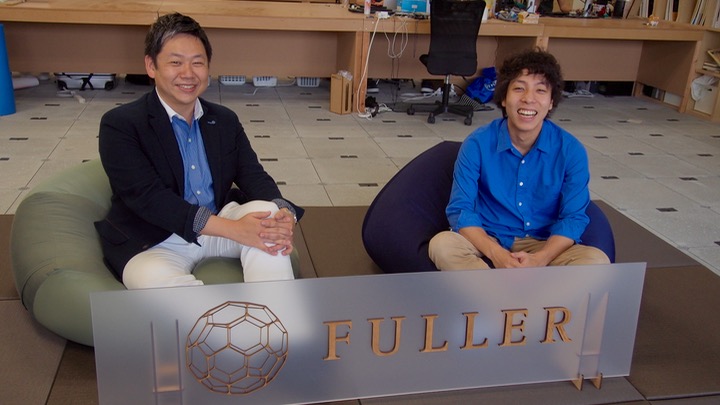<Discussion>Discovering the Future of Japan Through the Challenges of Tech Startups
Takashi Uehara (Corporate Business Planning Division, Bank of Tokyo-Mitsubishi UFJ; TEP Corporate Member)
Shuta Shibuya (CEO of FULLER, Inc.; TEP Entrepreneur Member)
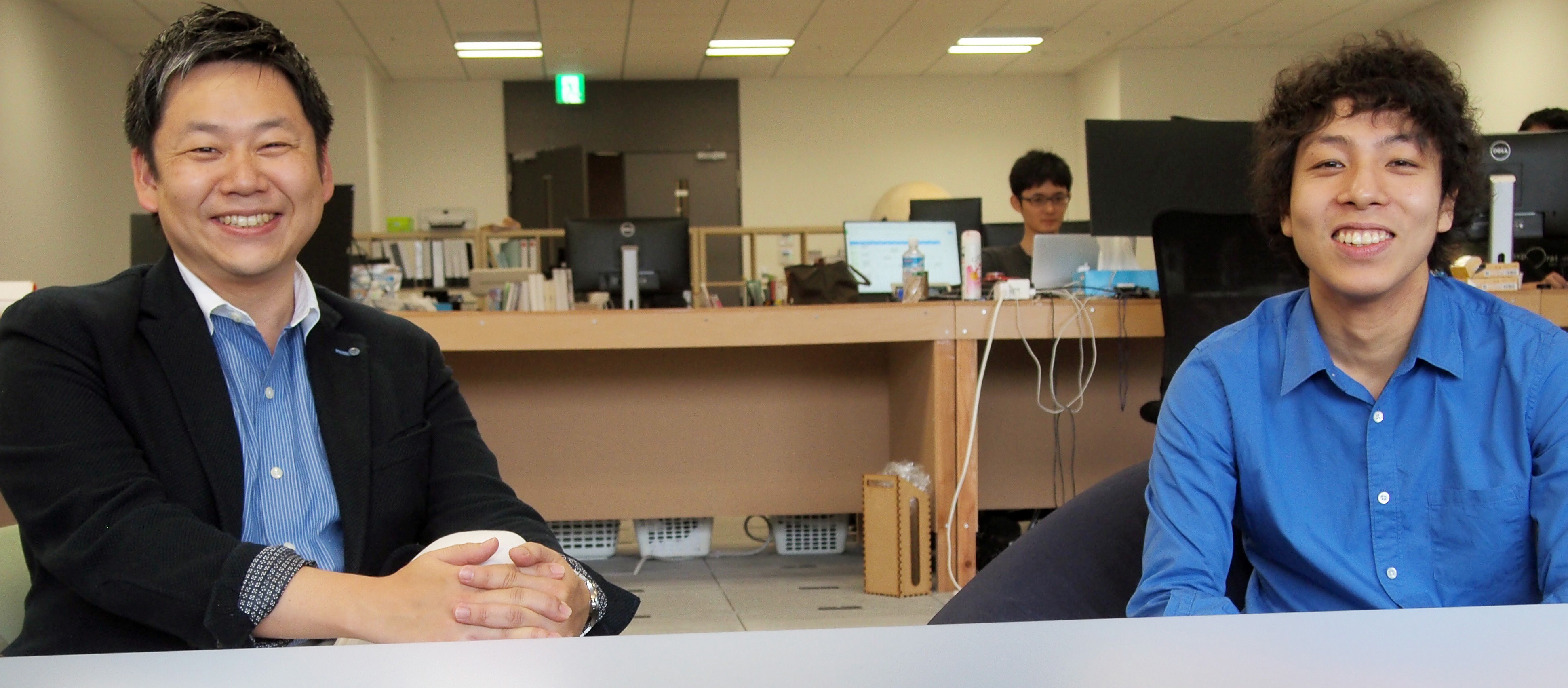
The second in this series is a conversation with TEP member Mr. Takashi Uehara from Bank of Tokyo-Mitsubishi UFJ, and Mr. Shuta Shibuya from FULLER. They talk about how they met through TEP and about the key to collaboration between large corporations and startups through their activities.
INDEX
1. A business proposal promptly rejected right after their first meeting
2.The untold story behind the development of corporate cards for startups
3.Building trust by speaking honestly and building businesses from trust
4. The expanding circle of collaboration
5. Advantages for both startups and large corporations
A business proposal promptly rejected right after their first meeting
First, tell us about FULLER's business.
Shibuya:We specialize in smartphone businesses in both the B2C and B2B spheres. In both cases, our mission is to offer solutions to problems that occur on smartphones. For B2C we utilize smartphone usage data to propose improvements on problems such as poor battery life or smartphone addiction. For B2B we offer a smartphone app analysis service called App Ape. In the app industry, you don't know which apps are used, who is using them, how often they are used, how many users there are, etc. App Ape is similar to a TV ratings survey device. App developers can see the usage statistics of their apps and competitor apps, as well as breakdowns of users by gender, age and more.
Now, what led the Bank of Tokyo-Mitsubishi UFJ to begin providing support for startups?
Uehara:Banks need customers. Our bank does business with a variety of companies, from small and medium-sized to large corporations. Commercial banks cannot survive without the cultivation of next-generation companies and industries. This is why we decided to build connections with startups. We started by collecting as much information as we could. Our mid-term management plan this year even includes a goal on supporting startups.
You seem to be very serious about this. Was it difficult to gain acceptance of this concept?
Uehara:It was about a year and a half ago that we began to think seriously about what it means to support startups. At first we barely even understood what a startup is. (laughs) When you don't understand something, you have to go see it for yourself. That's when we learned about and attended a TEP pitch meeting. We found a lot of different people engaged in interesting projects, so we instantly made the decision to join. It was at this pitch meeting that Mr. Shibutani made a presentation.
Shibuya:That was the first time our company attended a TEP pitch meeting.
Uehara: At first I was taken back by his casual attitude. (laughs) I couldn't figure out why he was smiling all the time. But from his presentation I saw that he had a solid business model. Each conversation I later had with him further convinced me of his business model.
Tell us about the collaborations between your companies.
Uehara:After that, I was the one that approached him first with a request. Our bank wanted to create an app-based service to support businesses. FULLER's business model allows them to collect data as the app is used. I was impressed with this approach and wanted to use it. But when we asked FULLER if they could develop the app for us, they turned us down. They said, "We don't do that." I went back to my office crestfallen. (laughs)
I think some companies would be happy to accept such an offer from a large corporation, even if the scope of the project differed somewhat from their business. I see FULLER is not that type of company.
Shibuya:That's right. But we'd be happy to work on a project in the future if it is a good match.
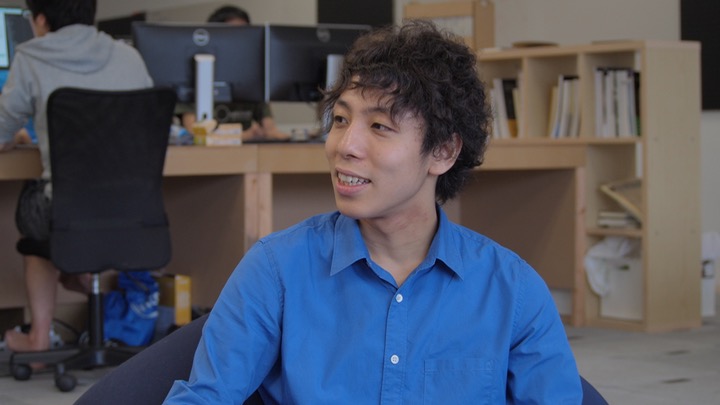
◀ Mr. Shuta SHIBUYA, CEO of FULLER, Inc.
The untold story behind the development of corporate cards for startups
What are corporate cards for startups?
Uehara:In corporate management, accounting is made much easier with the use of credit cards. Cash entails a lot of troublesome work, like processing accounts for each date or depositing accumulated accounts. But because startups don't have long track records, they aren't given high credit limits when they go through the standard reviewing process for credit cards. The credit limit they can get would be enough for an individual, but not for a corporation. We heard from many people about the difficulties this presented, but everyone was resigned to it. They seemed to think their credit limit was irrefutable, since that's what the credit card companies gave them.
That's an unexpectedly difficult problem.
Uehara:But I thought, does it have to be? NICOS is part of our group, so there had to be some solution to this problem. I asked a credit card company and they said they couldn't give a higher credit limit to a corporation unless someone provided a guarantee. So I asked, "What if a bank provides the guarantee?" and they said, "Then, yes." In effect, we created a system in which a startup puts a portion of their capital into our bank as a fixed term deposit, and in exchange the bank uses that as collateral to endorse the corporation. You must understand that this was just an experimental project, so I told everyone at the bank and credit card company not to develop an information system. An information system would make everything difficult, slow things down, and make failure unacceptable. Everything had to be done by manpower. (laughs) At first the people at the credit card company were worried. They asked me, "How many applications are you expecting?" I told them, "To start with, 20 or 30," and they thought that would be manageable. After that the process took about one month.
What was the credit limit?
Uehara:There’s no set limit, as long as the company makes a fixed term deposit.
Shibuya:We already used Bank of Tokyo-Mitsubishi UFJ for our accounts, and they generously agreed to use what we already had deposited.
Are there any other examples of collaborations?
Shibuya:At Mr. Uehara's suggestion we participated in a business contest for startups called Rise Up Festa. That's where we met some people from Mitsubishi UFJ Research and Consulting Co., Ltd., and we have been talking about working together on business ventures.
Uehara:It was our second Rise Up Festa, so we invited FULLER.
※ Rise Up Festa: A program for supporting small, medium-sized and growing companies engaged in innovative or unique businesses, or with new businesses that break down existing boundaries. Rise Up Festa supports these companies as medium or long-term business partners, leveraging the Mitsubishi UFJ Financial Group (MUFG) network and its extensive business support expertise.
Mr. Takashi UEHARA, Bank of Tokyo-Mitsubishi UFJ▶
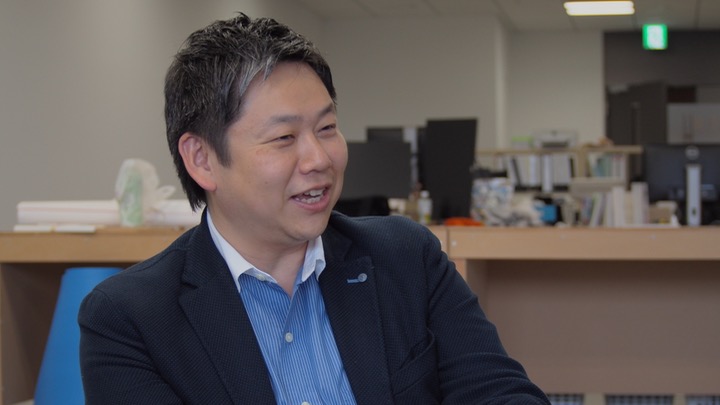
Building trust by speaking honestly and building businesses from trust
We sometimes hear about the difficulties of collaborations between large corporations and startups due to the lack of a “common language.” Did you ever experience that?
Uehara:Our common language is Japanese. (laughs)
Shibuya:If you take the average language of all large companies and the average language of all startups, there may be a difference. But considering how many people there are, there will be individual people who share a common language, and if you can find a match there you can start something.
Uehara:The problem is that startups think working with large corporations is too high of an obstacle, and managers at large companies just lack courage. (laughs) In reality, things work when they work, and don't when they don't. That’s all. There’s no reason to read into it too deeply.
Shibuya:Also, sometimes something might not be possible at the start, but becomes possible as you continue to discuss it. (laughs)
Uehara:You get interested in different things. On both sides.
It’s important to continue engaging in dialogue and deepening your relationship.
Shibuya:Exactly. And then when something comes up, hopefully you come to mind. If you want to be remembered, first you have to meet people.
Uehara:Yes, there has to be a contact point.
Other than that first encounter, is there anything you do to be remembered?
Shibuya:I think it’s important to always be honest. You have to say, “We can do this,” “We want to do that,” “We can’t do this now.” If you maintain that honesty, the other party will assign different labels to you.
Uehara:As I mentioned before, when we first approached FULLER they told us up front that they weren't able to develop the app we wanted. That left us with the impression that this executive was level-headed. It’s fine to have a goal and move into new business areas, but taking on new businesses without a strategy is going to make the angels and banks supporting you start to worry. Financial institutions will evaluate you more positively if you have a clear reason for your expansion.
Shibuya: Ah, I see. I didn't know that. (laughs)
Uehara:Management consists of a series of decisions, so people who can't make decisions aren’t cut out to be managers.
Shibuya:That's true. Doing things halfway will just cause trouble for the other party, so you need to communicate clearly. Of course, there are times when I can't say “No,” but saying “No” isn’t always rude. That’s why it’s important to communicate and engage in discussion.
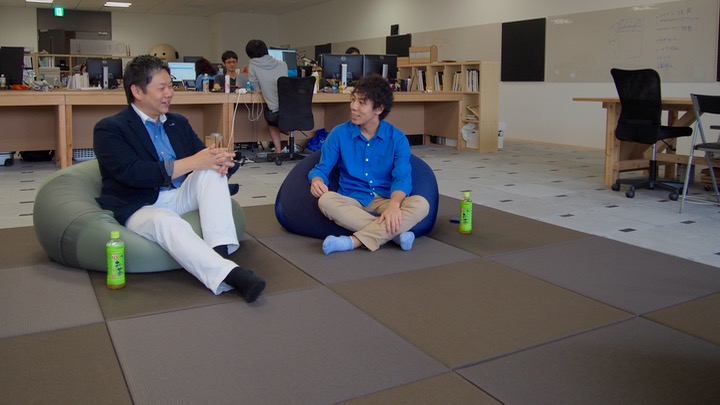
◀Interview on Tatami Place at FULLER's office pleced in KOIL
FULLER is engaged in collaborations with other large corporations as well?
Shibuya:We developed an app for Nihon Kotsu. In exchange, Nihon Kotsu posted ads in all of their taxis. This has been tremendously effective from a B2B standpoint. Businesspeople take taxis, so our attorney, shareholders, and other business partners have said, “We see those ads every morning.” (laughs) That repeated exposure has been really effective, and we have seen benefits in unexpected areas. We learned that if an opportunity promises to be meaningful even in a small way, it’s important to give it a shot. Also, consider the tatami mats we use in our company. They are made with used tea leaves from Ito En’s Oi Ocha bottled tea. Oi Ocha is actually really famous in Silicon Valley. They drink it at Google and Evernote. That’s because Oi Ocha's branding emphasizes the company's support of the IT industry. And In Japan, they use the play on words between “IT OEN” (“IT support”) and “ITO EN"! (laughs) They always bring tea to our events, and the tatami mats create a Japanese ambiance and facilitate casual conversation.
Is Bank of Tokyo-Mitsubishi UFJ engaged in any efforts with other startups?
Uehara:We actually work with a number of companies, one of which is a TEP Entrepreneur Member. It is a startup that converts audio to text. We thought that was interesting, so they are working on a prototype for us.
It sounds like there has been some fairly concrete progress. What kinds of needs will it serve?
Uehara:There is a lot of minor information in banks that doesn't get recorded. In the future, there will be fewer loans and more investments. Investment management is all about chains of information. For example, a bank might ask for an investment of 100 million yen, only to have the customer turn it down because they already invested at a securities company at a certain rate. However, this information could be useful upon maturity five years later. Securities companies and private bankers can have ongoing relationships with customers that span decades, but bank workers are often transferred so they are at a disadvantage. The bank business model is to record information into databases for use in business operations. So we wanted to record these conversations with customers, and we happened to come across this startup.
It sounds like it will provide a great deal of support for the banking business.
Uehara:That’s right. When it’s finished, managers will be able to create proposals using information dating five years back, which they never heard in person but was stored in a database. That’s what we are trying to create here.
How involved are you in actual development?
Uehara:Right now we are doing actual testing. We assigned one of our managers about a month ago, and we are identifying issues every week. (laughs) They have made a lot of improvements. The startup is a small one, with just two or three people working on the service, so they are able to implement the improvements quickly. They also benefit from this, as we are pointing out issues that they didn’t notice themselves.
Shibuya:Products develop better when customers are involved. User feedback is really important.
You grow a lot through your interactions.
Uehara: It’s tough, really though. (laughs) There was a point in the beginning when we thought it was going to be impossible, but we told our project manager to try just a little longer. With each incremental improvement he really got into it, and now he's like, “We definitely have got to use this!” That’s what happens when you work together. (laughs)
Advantages for both startups and large corporations
From a large corporation's perspective, what are the advantages of collaborating with a startup?
Uehara:If you want a service and you order it from a large corporation, they already have a set package, which will be expensive, and it's difficult to get what you really want. Startups, on the other hand, can create high quality products and services that do what we want for a reasonable budget. That’s a huge benefit. We happened to connect with FULLER and the startup I mentioned through TEP. So you never know what’s going to happen. You come across a startup, and you just get this feeling that things will work out.
How do collaborations with large corporations assist with startup growth?
Shibuya:When you share your observations and discoveries with large corporations, it facilitates the generation of new business ideas. There are a lot of common problems in the startup phase, so there must be common problems for large corporations in their own phase of maturity. But you wouldn’t find out about them except through conversation. Problems are actually urgent needs, and needs are business opportunities. That's why collaborations are extremely good for creating business ideas.
